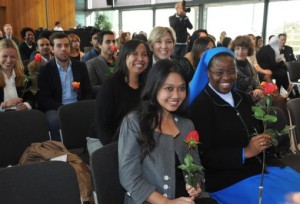Deutsche Welle Akademie provides training to media professionals with international backgrounds. In 2009 the educational arm of the Germany public-sector broadcasting service began offering a two-year Master’s programme for young professionals in cooperation with the University of Bonn and the Bonn-Rhein-Sieg University of Applied Sciences. Key aspects of the International Media Studies curriculum include critical, ethically-sound journalism, democratic principles and intercultural understanding.
For Christine Bukania, studying at DWA is pure luxury: Around-the-clock Internet availability and access to the latest literature, references and trade journals. These things are hard to come by in her native Kenya. The standards enjoyed by the 34-year-old Bukania are high even for Germany. Her International Media Studies Master’s programme at Deutsche Welle Akademie (DWA) in Bonn has only 30 students per semester. Media theory courses are taught by instructors and professors from DWA, the University of Bonn and the Bonn-Rhine-Sieg University of Applied Sciences. And when it comes to learning the tools of the trade, students receive instruction from experienced journalists and are given full access to the multi-media broadcaster’s TV and radio studios. The popularity of the programme therefore comes as no surprise – a total of 800 applicants vied for the much-coveted spots in the most recent application round.
The four-semester Master’s is specially designed for university graduates who have already gathered work experience in the media. Christine Bukania, for example, had worked in the communications department of a development aid organisation active in the area of elementary education advocacy in Kenya. Many of her fellow Master’s students have come to Germany from developing countries to hone their skills as media professionals. The programme includes courses on media management, management techniques, media power, media concentration, the role of the media in crisis situations, ethics and media law.
“There’s no such thing as absolute objectivity”
The Master’s students not only learn new techniques and approaches. “We also instil in our students a deep understanding in democratic processes and principles,” explains Professor Christoph Schmidt, the programme’s founder and academic head. Why? Because it is not included in media training in some parts of the world. It was definitely new for Juan Ju from China, who had to adhere to Party guidelines when she worked for a Chinese news agency. This is why she came to study in Germany, a country that she always associated with freedom and democracy. She arrived at DWA in Bonn by way of the University of Leipzig. She got to know an altogether different approach in Germany – conscientious and thorough research, for one, and checking information and statements for credibility. “German journalists are more critical,” says the 26-year-old Juan Ju. “But I have also learned that there’s no such thing as absolute objectivity. All we can do is report the best possible truth.”
The International Media Studies programme does more than focus on technical know-how. An equally important aspect is network building. “We are globalisation,” says Petra Kohnen, Head of International Study Programmes at DWA. The claim is justified, with last year’s programme participants coming from 27 different countries. This cultural diversity is a plus for everyone involved. The students make presentations on the local situation in their home countries, draw from their professional experience and engage in dialogue with their classmates. “I have a much broader view of the world now,” says Christine Bukania, who has spent two semesters in Bonn so far. “And I’ve made many friends.”






